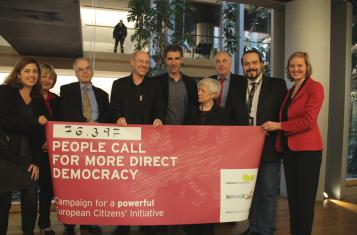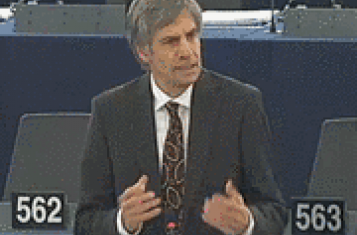Article 2 of the Treaty on European Union recognizes democracy as one of the founding values of European Union (EU).
The reforms implemented by the Treaty of Lisbon in 2007 outlined a new form of democratic system, as they introduced, besides the traditional representative method, a participatory approach. Citizen’s participation in policies (included by the White Paper of 2001 among the five important principles to form a good governance) has now constitutional relevance through the Title II of the Treaty on European Union, entitled “Provisions on Democratic Principles”.
Participatory democracy in the EU Treaties
The most significant provision is article 11, paragraph 4, as it attributes to one million citizens the power to invite the European Commission to submit a proposal on matters where they consider an act of the EU is required. Through this extraordinaire transnational instrument of participatory democracy, every single citizen of EU has the concrete chance to collaborate, even if partially, with the institutions.
Legally establishing the European Citizens’ Initiative (ECI) with regulation (EU) 211/2011, the European Union put at the centre of its political action the will to join peoples of EU and the intention to create a unique European demos able to discuss and exchange ideas.
Nevertheless, since 2012 only three ECIs, among the 56 presented, concluded their course and reached the institutions, while the registration for 20 of them has been refused by the European Commission. For all of them the Commission exhibited the same motivation: “the initiative manifestly does not fall within the Commission’s powers to submit a proposal for the adoption of a legal act of the European Union for the purpose of implementing the Treaties”.
EU court rulings
In view of this motivation, are there any ways to increase the rate of successful ECIs? The first two decisions of the General Court (First Chamber) may help us to understand better if this fundamental democratic tool has any room for improvement.
Mr Anagnostakis, the initiator of the ECI “One million signatures for a Europe of solidarity”, was the first one who appealed the Commission's decision to reject this ECI. The Court decided the matter on 30 September 2015 and confirmed the decision of the Commission to not register the initiative.
On 5 November 2013 the Commission rejected the ECI entitled “Right to Lifelong Care: Leading a life of dignity and independence is a fundamental right!”. The promoters, Mr. Costantini and others, applied for the annulment of the Commission’s refusal in order to obtain the registration of the ECI.
On 19 April 2016 the Court gave its final judgement and confirmed the institution’s decision. As pointed out at par. 72 of the sentence, the refusal to register an ECI is «an action that may impinge upon the very effectiveness of the right of citizens to submit an ECI». Thus the Commission’s decision must clearly underline the reasons of the refusal so that the citizens are capable of understanding them.
Both matters rely on the same grounds: initiatives’ vagueness regarding the condition for applying the Treaties’ provisions and difficulties in finding sufficient legal basis for the proposed ECI. In other words, citizens have not been able to provide correct legal frameworks to their proposals and so the Commission declared its inability to adopt the proposed measures. Even the chance to register part of the initiative or to shift the legal basis has been denied by the European institution and the Court. Is it to be like this?
The Court’s both decisions tell us that, in order to be effective, an ECI must present a precise recall of the Treaties’ provisions that allow the Commission to exercise its power of legislative initiative. Mentioned only in the Annex II to the Reg. (EU) 211/2011 and described as “required information”, the relevant articles of the Treaties prove in fact to be essential in order to register an ECI.
Conclusion
The Commission’s decision is totally based on the analysis of their correspondence to its competences. This implies a difficult task for European citizens: create an ECI that accurately falls within the competences of the institution and identify the exact articles to legitimize this conformity. This would be easy for EU law experts, but is it achievable for every single European citizen?
The EU leaders should encourage the use of this innovative tool of transnational democracy and not restrict it by assuming excessive conflicting positions. The EU institutions should come forward to their citizens, be more flexible and meet their aspirations for a more constructive political debate. Citizens’ participation is essential to the building of a concrete democratic context, where people can trust institutions and institutions can listen to people’s voice.
Maria Celeste Petrini lives in Civitanova Marche, a small city in Italy. She is a PhD student in Law in her second year at University of Macerata, where she collaborates within the Department of Constitutional Law. Her research interests include European Union law, European constitutional law, intellectual property law. We cordially thank her for her contribution.



